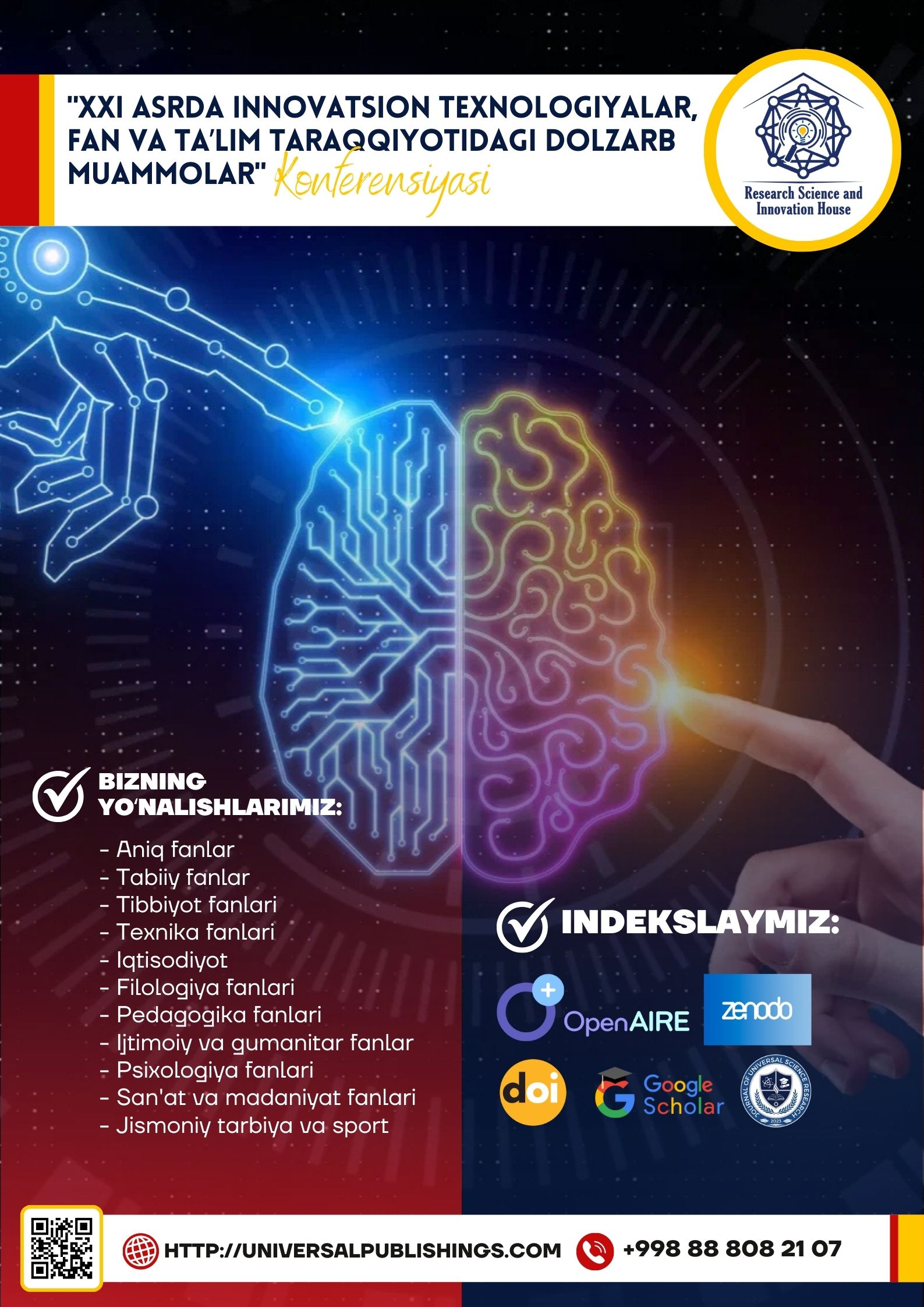Abstract
This article explores the linguistic phenomenon of substantivization of adjectives, a process by which adjectives transform into nouns to represent abstract concepts, groups, or qualities. The article first defines substantivization and explains how it allows adjectives to function as nouns through the use of definite articles, plural markers, or suffixes. It then examines how different languages, including English, German, French, and Spanish, apply substantivization, highlighting examples like "the rich" or "les jeunes." In addition, the article discusses the importance of substantivization in enhancing language efficiency, flexibility, and expressiveness. It enables speakers to encapsulate complex ideas concisely, contributing to clearer and more nuanced communication. The article concludes by noting that substantivization enriches language's poetic and figurative capabilities, making it an invaluable tool across diverse linguistic contexts.
References
1. Anderson, S. R. (2005). Modern Linguistics: Theory and Practice. Wiley-Blackwell.
2. Bauer, L. (2003). Introducing Linguistic Morphology. Edinburgh University Press.
3. Bickerton, D. (1990). Language and Species. University of Chicago Press.
4. Chomsky, N. (1981). Lectures on Government and Binding. Foris Publications.
5. Grimshaw, J. (1990). Argument Structure. MIT Press.
6. Haspelmath, M. (2002). Understanding Morphology. Oxford University Press.
7. Pinker, S. (1994). The Language Instinct: How the Mind Creates Language. HarperCollins.
8. Teshaboyeva, N., & Mamayoqubova, S. (2020). COMMUNICATIVE APPROACH TO LANGUAGE TEACHING. In МОЛОДОЙ ИССЛЕДОВАТЕЛЬ: ВЫЗОВЫ И ПЕРСПЕКТИВЫ (pp. 409-414).
9. Teshaboyeva, N. (2020). LINGUISTIC PERSONALITY, ITS STRUCTURAL CHARACTERISTICS IN THE NEW PERSPECTIVE DIRECTIONS. In МОЛОДОЙ ИССЛЕДОВАТЕЛЬ: ВЫЗОВЫ И ПЕРСПЕКТИВЫ (pp. 415-420).
10. Teshaboyeva, N. Z. (2019). TEACHING ENGLISH THROUGH LITERATURE INTESL AND TEFL CLASSROOMS. In СОВРЕМЕННЫЕ ТЕХНОЛОГИИ: АКТУАЛЬНЫЕ ВОПРОСЫ, ДОСТИЖЕНИЯ И ИННОВАЦИИ (pp. 82-84).
11. Хидирова, Д., & Тешабоева, Н. (2022). Pedagogical conditions for the development of the healthy thinking in students. Zamonaviy innovatsion tadqiqotlarning dolzarb muammolari va rivojlanish tendensiyalari: yechimlar va istiqbollar, 1(1), 120-122.
12. Gaybullayeva, N. D. K., & Kizi, T. N. Z. (2022). THE ROLE OF INNOVATIVE METHODS FOR LISTENING COMPREHENSION IN TEACHING LANGUAGE LEARNERS FOREIGN LANGUAGES AND MAINLY ENGLISH. Central Asian Research Journal for Interdisciplinary Studies (CARJIS), 2(10), 8-10.
13. Teshaboyeva Nafisa Zubaydulla qizi, Jurayev Muhammadrahim Murod o’g’li, & Mamirova Munisa Rajab qizi. (2021). Language Learning Culturally and the Role of Literature in Teaching Process. Central Asian Journal of Theoretical and Applied Science, 2(3), 1-5. Retrieved from https://www.cajotas.centralasianstudies.org/index.php/CAJOTAS/article/view/84
14. Teshaboyeva, N. (2023). THE IMPORTANCE OF TOURISM IN PRESENT DAY. Журнал иностранных языков и лингвистики, 5(5).
15. Teshaboyeva, N. (2023). THE MODERN INNOVATIVE TECHNOLOGIES IN TEACHING FOREIGN LANGUAGES. Журнал иностранных языков и лингвистики, 5(5).
16. Teshaboyeva, N. Z. (2023, November). Adjective word group and its types. In " Conference on Universal Science Research 2023" (Vol. 1, No. 11, pp. 59-61).
17. Teshaboyeva, N. Z. (2023, November). Modifications of Consonants in Connected speech. In " Conference on Universal Science Research 2023" (Vol. 1, No. 11, pp. 7-9).
18. Teshaboyeva, N., & Rayimberdiyev, S. (2023, May). THE IMPORTANCE OF USING MULTIMEDIA TECHNOLOGY IN TEACHING ENGLISH CLASSES. In Academic International Conference on Multi-Disciplinary Studies and Education (Vol. 1, No. 8, pp. 149-153).
19. Nafisa, T., & Marina, S. (2023). TEACHING AND LEARNING OF ENGLISH VOCABULARY IN TESL AND TEFL CLASSROOMS. International Journal of Contemporary Scientific and Technical Research, 465-469.

